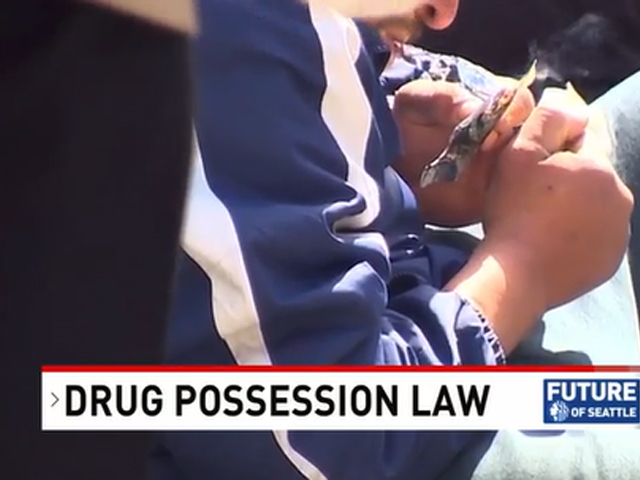News
KOMO 4: Downtown Seattle leaders say city council ‘failed’ in rejecting drug possession law
Posted on

This story was originally published by KOMO 4 on June 7, 2023
SEATTLE — Downtown Seattle’s biggest constituencies are backing away from Seattle City Council member Andrew Lewis after his surprise rejection of a new drug possession law.
On Wednesday, the Downtown Seattle Association (DSA) President walked back from a public endorsement of Lewis after the freshman council member flip-flopped on a commitment to approve the ordinance.
Downtown has been hit hardest by the fentanyl crisis, where open-air drug use is prevalent.
“I’m disappointed in his vote. He has been somebody who has been thoughtful and responsive to our needs and issues in downtown and district seven. Yesterday his vote did not reflect that,” said Scholes in an interview with KOMO News. Lewis lists the longtime DSA leader on the list of his endorsements on his campaign website.
But when asked Wednesday, Scholes said, “I didn’t endorse him. You know, politicians will take some liberties with things that we say.”
Scholes represents 1700 Downtown businesses and organizations.
Lewis has been working the cocktail circuit for the past several months, rallying for donors and endorsements. He seemed to acknowledge the oncoming criticism when he delivered his tiebreaking speech at the hours-long meeting.
“I understand that it polls well right now,” he said about his vote. “It’s more important than whether I stay on this dias.”
Lewis ended up siding with the majority, raising issues about the elimination of community court and a need for a full vetting of the proposal and financial impacts. City Attorney Ann Davison had argued Seattle needed to codify the new state law making drug possession a gross misdemeanor to enforce it. She cited King County Prosecutor Leesa Manion’s memo, which suggested her office is not staffed to enforce the law, which begins July 1.
Proponents, on the other hand, argue that if there is no written enforcement code, it would deter police from arresting anyone for dealing or using hard drugs in public and in theory, decriminalizing drugs in Seattle.
Seattle Chamber President and CEO Rachel Smith also railed against the Council vote:
“(Tuesday’s) action by the council was chaotic and disappointing. We know that there is no one solution to keep everyone in our community safe and healthy from the scourge of fentanyl – it is going to take an all-of-the-above approach, but thousands of people are dying on the streets of Seattle, and that is completely unacceptable.”
“Too many watching, (the) Council meeting felt a lot more like political posturing than policy debate, from the ‘war on drugs’ narrative to lamenting a lack of process despite a decision by the Public Safety Chair to send the legislation straight to a full Council vote,” Smith continued. “(The) no vote is not allowing our community to move forward together – it slammed on the brakes. It is now incumbent on the City Council and Mayor to articulate what their plan is to address this crisis because so far they have failed.”
Lewis seemed to be well positioned for another term as the filing deadline passed. He had raised the most money of any candidate in any race.
Yet, the surprise vote may have altered the trajectory. Two other candidates seized on Lewis’ vote.
Olga Sagan, who owns Piroshky Piroshky, posted in a tweet, “Why would we pay the county to do this rather than hold this responsibility ourselves? We need to expand our efforts to treat substance abuse as a public health crisis, AND we need to prevent the use of drugs in public spaces. Both of these things can be true at the same time.”
Bob Kettle, who entered the race at the filing deadline, and has raised close to the same amount as Sagan, said in an interview, “I was astounded. But not surprised because councilmember Lewis flip-flops again and again and again. Just this past spring, he was bemoaning the fact that drug dealers on Third Avenue were acting with impunity. Now this summer, he’s just voted to basically enable them was astounding and, frankly, reckless.”
Kettle said he would have co-sponsored the legislation to enforce the law. “It’s the old adage, ‘Fool me once, shame on you. Fool me twice, or, in this case, with council number Lewis, two dozen plus times, shame on me.’”
“We have to get our Seattle municipal code in line with the state law and all the things that do for not just on the private security side, but also for the public health side,” said Kettle.
Lewis released a statement in part that says, “I think it is generally proper for us to do (pass the ordinance). But with the ending of a community court, without any insight into the implementation of this law, and with no guarantees that the legislature’s intent for diversion and treatment would be prioritized, I cannot support this approach.”
Councilmember Lisa Herbold, who chairs the Public Safety Committee and authorized sending the bill straight to Council, also issued a pair of press releases saying the lack of action does not decriminalize drugs.
Scholes cites multiple recent polls that say the public wants legislative action and says the parsing of words does little to change one thing.
“I’m just disappointed again lack of action by the city council to deal with the central crisis in our city people dying on our streets from drugs. They’ve got no plan, and they rejected the one that the City Attorney and two council members brought forward. The question I think the public is asking and the business community are asking is what’s your plan to deal with this emergency that’s affecting our city?”